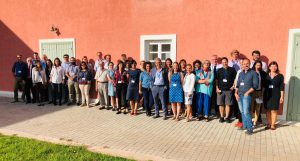Save the date – 3rd December 2018 – Systems Change Thinking Event: Creating Value and Closing the Loop from Unavoidable Food Supply Chain Wastes
Register for FREE at https://lnkd.in/gGJPi55
Deadline for registrations Friday 16th November 2018.
Save the date – 3rd December 2018 – Systems Change Thinking Event: Creating Value and Closing the Loop from Unavoidable Food Supply Chain Wastes
Register for FREE at https://lnkd.in/gGJPi55
Deadline for registrations Friday 16th November 2018.
The 7th European Environmental Evaluators Network Forum (2018 EEEN Forum) will bring together evaluation practitioners, academics, policy-makers, representatives of civil society and other users of environmental evaluations to share views, knowledge and experiences about the impact of evaluating environment and climate policies in recent years.
Registration for the event is open until 12th November 2018.
For further details please click here.
Interested in environmental footprinting and the existing LCA standards? Join our colleague from ECOS Mathilde Crêpy for an exciting webinar on November 14th, 2018.
Registration is free. Please click here for details.
The STAR-ProBio mid-term meeting took place last week in Greece at the Agricultural University of Athens. It was a very useful and productive meeting.
A special thanks to all External Advisory Board and External Review Committee members for their active participation and constructive feedback!

The Bio-based Products Social Sustainability Workshop was held on the 27th of September 2018 from 11:00 to 13:00, as a side event of the IFIB- International Forum on Industrial Biotechnology and Bioeconomy (https://ifib2018.b2match.io). Social Life Cycle Assessment may involve a broad spectrum of aspects directly affecting stakeholders, encompassing human rights, working conditions, health and safety issues, equity, social responsibility, job creation and participation in society. Therefore, the consideration of stakeholders perspectives, when formulating the most relevant aspects to be included in a social sustainability assessment for bio-based products, is of major importance.
What is bioeconomy? What are bio-based products? Is it possible to make more sustainable choices for the environment and for our health?
Visit the BIOECONOMY VILLAGE on May 24th from 11 am to 4 pm to discover it!
In the context of the Festival of Sustainable Development 2018, the main Italian contribution to the EUROPEAN SUSTAINABLE DEVELOPMENT WEEK, we’ll wait for you at Unitelma Sapienza (Viale Regina Elena, 295).
Promoted by the BIOWAYS, STAR-ProBio, BIOVOICES and EXCornsEED projects, funded by the European Commission, the BIOECONOMY VILLAGE aims to raise awareness among the public, improve knowledge about bio-based products and promote the applications and the benefits of bioeconomy, circular economy and sustainability, fostering dialogue, discussion and sharing between the general public, researchers and companies. Through research and products samples and practical demonstrations, will be showcased to the visitors, in a simple and engaging way, how bioeconomy is increasingly part of our daily lives and how consumers’ choices can have a positive impact on the environment, society and the economy. Innovative tools such as games (serious games, video games and quizzes) will be used.
CNR, APRE, UNITELMA Sapienza, La Sapienza, FVA New Media Research, Ecozema, Minimo Impatto, BY-entO, Algaria (Spireat) will be present, together with the European projects BIOVoices, BIOWAYS, STAR-ProBio, EXCornsEED, Leguval e Biobottle.

The UWM Internal Seminar “Sustainability Transition Assessment and Research of Bio-based Products: Progression and Shortcomings of Current Sustainability Standards of Bio-based Products” took place on the 22nd of March at the campus of the University of Warmia and Mazury in Olsztyn.
The goal of the seminar, consisting of 9 presentations on the scientific disciplines of agriculture, environmental management, economics and law, was to discuss research and activities performed within the STAR-ProBio project.
The event attracted 17 participants.


STAR-ProBio is organising its 1st international workshop, which will take place at the Climate Show in Geneva on the 6th of April.
This international workshop will bring together a broad range of stakeholders with interest in the EU bioeconomy.
Download the latest programme for the event.
More information can be found at www.climateshow.ch/en/star-probio-registration/